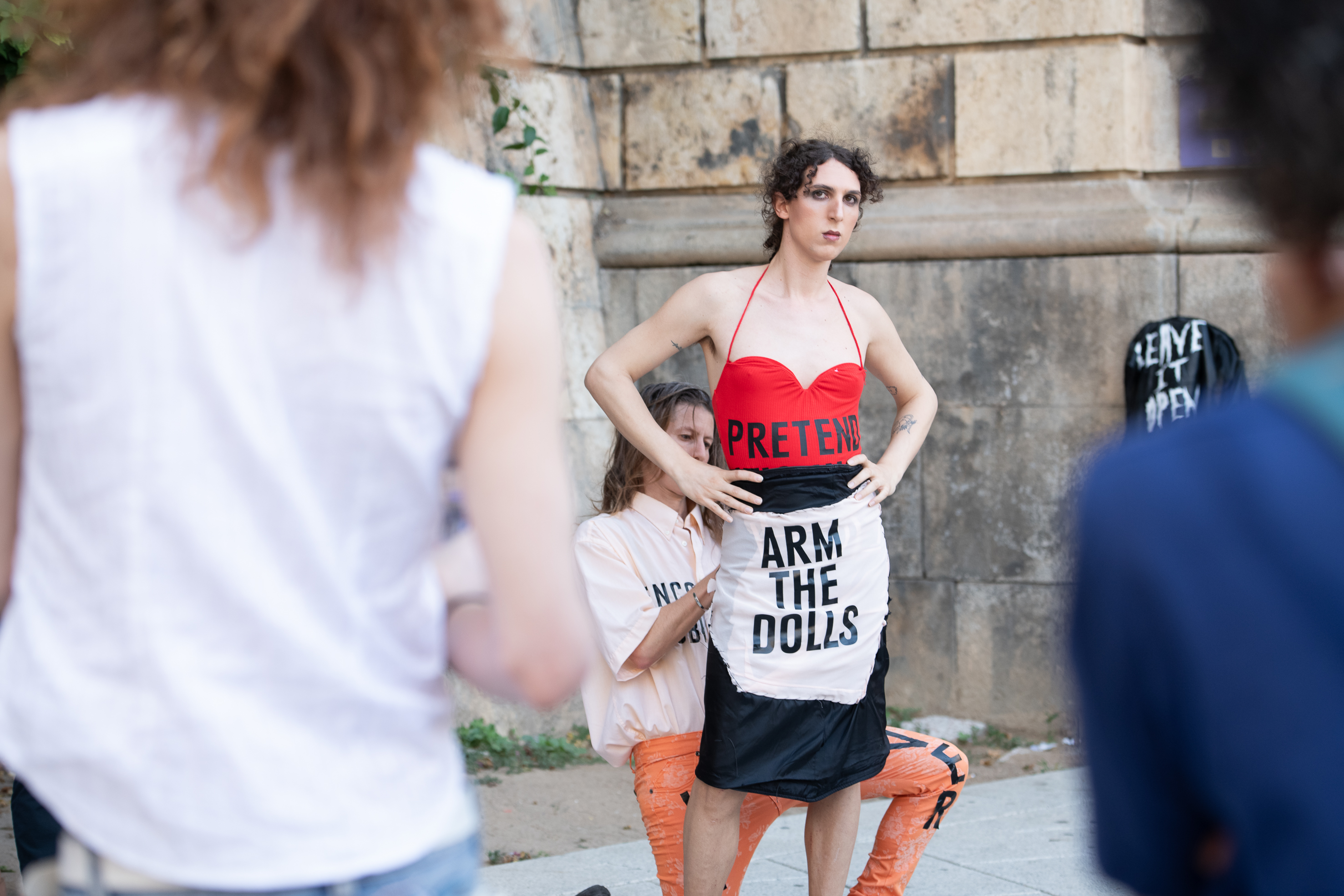Pretend it’s a Toilet
 ph Federica Iannuzzi, Lavanderia a Vapore_ Torino 2024
ph Federica Iannuzzi, Lavanderia a Vapore_ Torino 2024Pretend it’s a Toilet
[Free 2 Pee Starter Pack]A project by Sara Leghissa, dramaturgy collaboration Sandra Cane and Tomas Gonzalez, created and activated by Sara Leghissa and Serafine Pala, sound Lillhee, graphic design Marzia Dalfini, costumes design Lucia Gallone, choreographic assistance Michele Rizzo and Catalina Insignares, executive production Federica Iannuzzi. Produced by Associazione L’Altra coproduced by Les Halles de Schaerbeek, Teatro Prospero / ROM - Residency On the Move, Kunstencentrum Viernulvier, far Nyon, Lavanderia a Vapore.
“Noi vogliamo solo pisciare, ma ci tocca la resistenza anche per quello”
Isa Borrelli
“We just want to pee, but we have to resist even for that”
Isa Borrelli
Isa Borrelli
[ITA]
“Lo spazio di per sé è neutro, è la presenza dei corpi "normati" che rende un certo luogo un luogo di potere.” Sandra Cane
Può il bagno pubblico - storicamente luogo della socialità queer e allo stesso tempo dell’applicazione e mantenimento delle politiche binarie - servire come pretesto per interrogare le dinamiche di potere, che ci permettono o impediscono di prendere posizione rispetto a regole non scritte? Perché alcuni corpi sentono di essere nel posto giusto rispetto ad altri e quindi in diritto di dire agli altri che cosa fare? Possiamo intercettare queste dinamiche e metterci insieme per creare un piccolo corto circuito? Nelle società moderne non abbiamo più bisogno di un sistema di controllo, ma siamo noi stess3 ad autoregolare i nostri e gli altri corpi. Ma come i corpi sono mutevoli e intersezionali, così sono gli spazi.
La performance si svolge intorno ad un bagno pubblico, dove il pubblico è invitato ad aspettare. Il progetto affronta il tema di come i corpi siano regolati nello spazio pubblico attraverso meccanismi di autodisciplina, in particolare in relazione alle strutture di potere cis-eteropatriarcali e oltre. Si interroga su come certi corpi si sentano autorizzati a dettare il comportamento e la presenza ai corpi non normati, e usa il bagno come espediente per affrontare queste tematiche, a causa della sua regolamentazione legata al binarismo di genere.
Il progetto è stato presentato in anteprima alla Lavanderia a Vapore di Torino (IT) e successivamente al far Festival di Nyon (CH), al Kunstencentrum Viernulvier di Gent (BE) e a SardegnaTeatro di Cagliari (IT).
A questo link alcuni video della performance a Vernulvier, Gent: PRETEND IT’S A TOILET - Clips e trailers
Qui in un formato esplorativo, in dialogo con Layout Magazine, adattato al contesto di Spazio Serra, Milano:
PRETEND IT’S A TOILET/ Versione speciale
[ENG]
“Space is neutral, it is the presence of 'normed' bodies that makes a specific space a place of power.” Sandra Cane
Can the public bathroom – both the place of historical queer sociability and at the same time of binary politics enforcement – serve as an excuse to interrogate the power dynamics that permit or prevent us to take a position with respect to unwritten rules? Why do some bodies feel they are in the right place compared to others and therefore entitled to tell others what to do? Can we intercept these dynamics and get together to create a little short circuit? In modern societies we no longer need a controlling system, but it is we, ourselves, who self-regulate our own and other bodies. But just as bodies are mutable and intersectional, so are spaces.
The performance is situated around a public toilet, where the audience is invited to waitand observe the artists as they move through the space wearing garments printed withtexts. The project addresses how bodies are regulated in public space throughmechanisms of self-discipline, particularly in relation to cis-heteropatriarchal powerstructures—and beyond.It questions how certain bodies feel entitled to dictate the behaviour and presence ofothers, and it takes the toilet as an example, because of the regulation related to genderbinarism.
The project premiered at Lavanderia a Vapore in Turin (IT) and it was later presented at far Festival in Nyon (CH), at Kunstencentrum Viernulvier in Gent (BE) and at SardegnaTeatro in Cagliari (IT).
At this link some video trailers of the performance in Vernulvier, Gent:
PRETEND IT’S A TOILET - Clips and Trailers
Exploratory format and adaptation of the work to the context of Spazio Serra, Milano, in conversation with Layout Magazine:
PRETEND IT’S A TOILET/ Special version


Pics by @lepommefoto Sardegna Teatro 2025 and ©Arya Dil, far° Nyon 2024